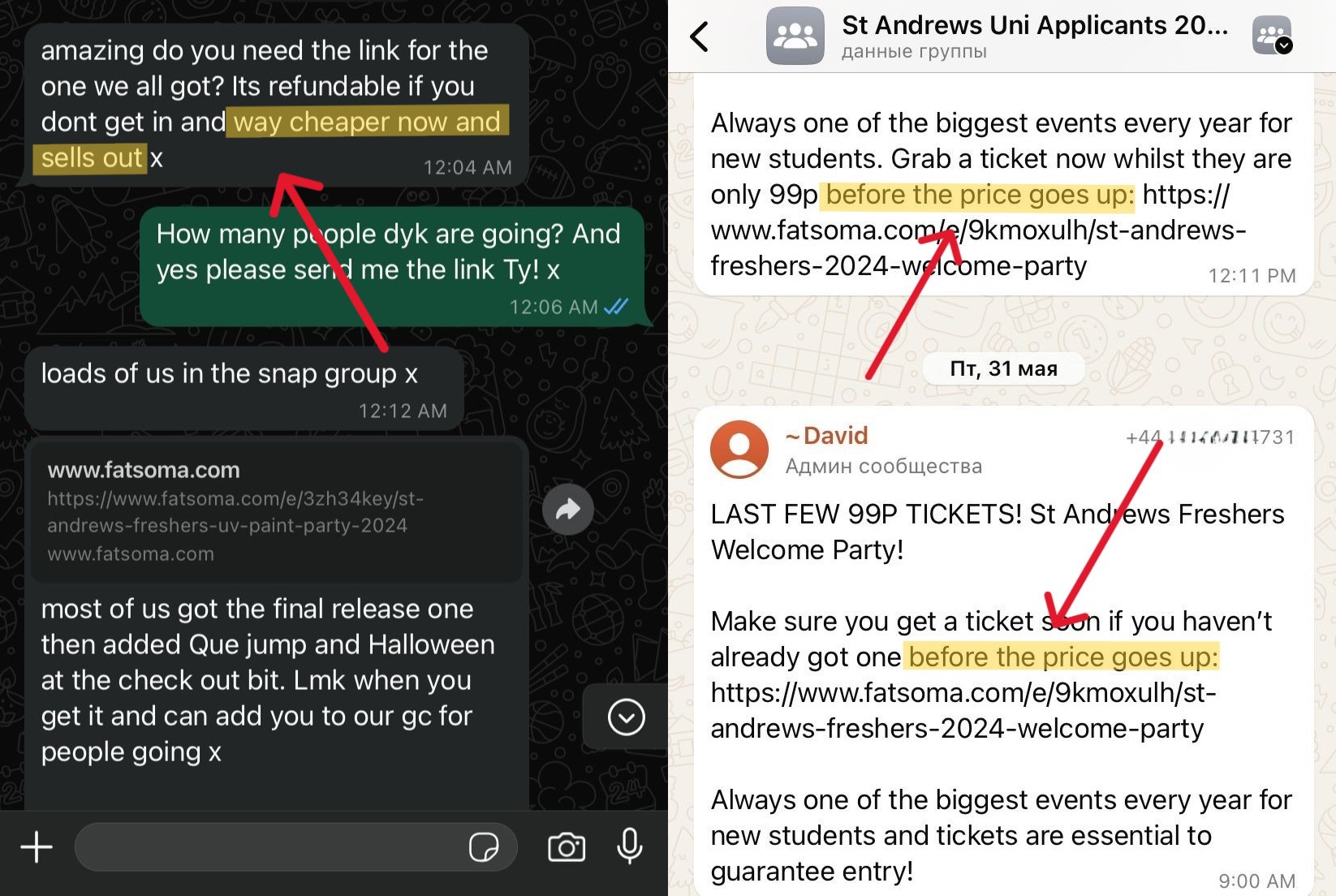Scam advice for freshers

If you're reading this, then it's very likely that you're an offer holder to St Andrews. If so, first off - congratulations! However, you're also a prime target for many scam organisations trying to part you of your money. The prospect of heading off to university and starting a whole new chapter of your life is exciting, but don't let FOMO cloud your judgement!
Below is some advice for avoiding getting scammed, especially regarding the Fatsoma Freshers' Week ticket scam.

For more information on the Fatsoma scam, check out this article written by a current student at St Andrews, and read about their experience with the scam last year.
But I already know all of this!
If you haven't already, I very strongly recommend you read this article anyways, just in case.
Don't let your arrogance get the best of you, even if you're normally very scam-aware! The people running many of these scams have been doing so for years across all of Scotland, and they're quite good at it.
This year, I've already witnessed several dozen people fall for a freshers' tickets scam, which was run by the administrators of a WhatsApp community with over 200 new students in it. It's better to be safe than sorry!
Help, I think I've already fallen for a scam!
Head further down this article for advice on what to do next.
What can I do to help combat this?
Head to the bottom of this article for information on that, and thank you :>
Don't trust DMs!
Be suspicious of anyone who direct messages you, whether on WhatsApp, Instagram, Facebook, or any other communication platform. Are they really another student wanting to get to know you, or are they trying to get you buy something or click a link? If so, what motive could they have to do so? Often, the reason will be malicious.
Check your sources!
Always make sure your sources of information are trustworthy. If you're reading an email, check the sender address - not just the sender name, as it can be spoofed to anything by anybody. If you're on a website, check the URL and be wary of any site which isn't either the official university website (https://www.st-andrews.ac.uk/) or the student union website (https://www.yourunion.net/). Be wary of ALL social media accounts, no matter how many followers they have or how trustworthy they seem - social media accounts are the easiest to fake.
Calls to action are a red flag!
A call to action is where someone or something tries to get you to go do something such as click on a link, download a file, fill out a form, log in to a website, and so on. Often, these are presented with a sense of urgency as well - telling you that something is available for only a short time or that you have to rush for some other reason. Scammers use their urgency to cloud your judgement and make hasty decisions, usually to part you of your money or other sensitive information.
Don't let scammers weaponise your fear of missing out!
Freshers' events are nothing new, and the people running them are experienced with how popular they tend to be and accommodate accordingly. In fact, you can even buy tickets for many events right at the doorstep on the day!

I've been scammed!
If you suspect you have fallen for a scam already, don't panic, but take action immediately! The longer you wait, the trickier it could be to remediate.
If you've paid for something dodgy or entered payment credentials on an untrusted site, then contact your bank immediately. Let them know about what happened, and request a refund / chargeback if you've paid already. (If you don't know what a chargeback is, Visa has an article which explains the process.) Just in case, keep an eye on your transactions and/or bank statements to make sure there's no dodgy activity.
If you've entered sensitive login details (e.g. your login details for St Andrews E-Vision / the accommodation portal) into any non-university website or sent them to anybody at all, then people could do Very Bad Stuff™️ with that.
Depending on what credentials were shared:
- Change your password, if you can.
- Turn on 2-factor authentication (2FA), if you can. This is getting increasingly important (in fact, the university actually forces you to use it for your Microsoft account!) and if you've been putting this off, now is the time.
- Contact the university if anything related to your university application or login has been compromised. There's a lot at stake otherwise!
How to help
Alright, you've read all of the above, done your homework, and have vaccinated yourself with the knowledge of how to avoid common scams. If you wish to go above and beyond though, you might be now asking yourself, "What can I do to combat this?"
Luckily, there are a few things you can do:
- If you've witnessed a scam directed at either yourself or others, report the scam. You can do so on the Action Fraud website or by calling 0300 123 2040.
- Raise awareness of common scams and share advice on avoiding them, where possible. Friends don't let friends fall for fraud! Share this page with others for extra brownie points.
- Contact communications channels such as official University or Student Union social media accounts, and try to convince them to push out more information on safety and scam avoidance.
Raising awareness is the best solution - if everyone knows how to avoid scams, then there will be nobody left to scam. The unfortunate reality is that digital scams are incredibly hard to track down, so the best way to fight the scammers is indirectly.